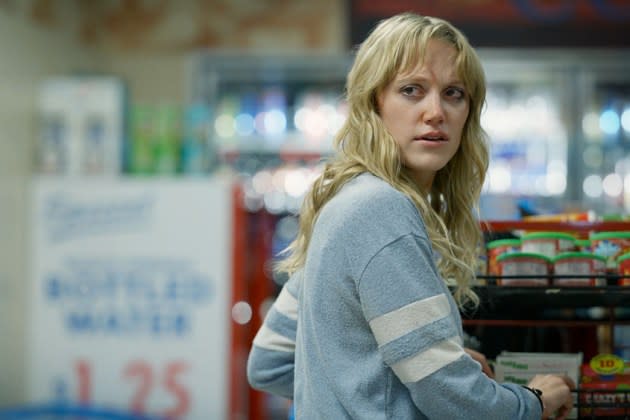‘The Stranger’s’ Unlikely Second Act: How Veena Sud Turned Her Quibi Series Into a Feature Film for Hulu
- Oops!Something went wrong.Please try again later.

In April 2020, “The Stranger,” the story of a driver who picks up the rideshare passenger from hell, debuted on Quibi with the world in lockdown. Like most of the bite-sized pieces of entertainment that premiered on the service it came and went without much fanfare, a fate that ultimately was shared by Quibi itself. Launched by Jeffrey Katzenberg with the idea of making short pieces of content that could be consumed on smartphones by people in transit, Quibi had the misfortune of launching as COVID-19 was leading the world into an extended period of couch potato-dom.
“Obviously, the timing was unfortunate,” says Veena Sud, the writer, director and show-runner of “The Stranger.” “But Jeffrey was very generous in supporting all of us filmmakers over the course of making our shows. It just didn’t succeed.”
More from Variety
But “The Stranger” has a fresh chance to connect with audiences who may have missed it the first time around. Sud has recut the series as a feature film for Hulu, where it will debut on April 15. Its improbable second act has a lot to do with Quibi’s unique business model, which allowed the creators who worked for the digital startup to regain the underlying copyright for their shows after two years.
“Jeffrey was able to get a lot of people interested in Quibi, not just because what it represented creatively, but because he told us we could own our work, which is never done,” says Sud. “It blew everyone’s mind.”
So even as Sud prepped “The Stranger,” assembling a cast that included Dane DeHaan and “It Follows” breakout Maika Monroe, she thought about finding a way to eventually reconstruct the spooky story so it worked as both a series of interconnected episodes and as a seamless 100-minute feature. That helped Sud keep costs low when she eventually re-edited the work for Hulu, and it made things more efficient. Sud and editor Phillip Fowler spent roughly a month and a half working on stringing the 10-minute chapters into a movie. Much of that meant eliminating any cliffhangers that were placed at the end of each episode so people would stay tuned for the next installment.
“Those moments feel bizarre and just unnecessary when you’re making a feature,” she says. “So it was really just about smoothing things and finding the right pacing.”
Aside from that, there was some re-coloring that had to happen, but there weren’t major reshoots. “We didn’t have to go through some film vault,” Sud says. “It was all there.”
Quibi ultimately shut down less than a year after “The Stranger” debuted, having blown through $1.75 billion in cash without finding much of an audience. Its library was sold to Roku for less than $100 million. After the copyright reverted back to Sud, she went about trying to find a new home for “The Stranger,” leading to some frustrating conversations with puzzled distributors.
“All the platforms want content and this genre of psychological thrillers and horror is quite popular,” Sud says. “No one was like, ‘we don’t want it.’ It was simply, ‘we don’t understand. Is this a TV show? Or a movie? How can a TV show become a movie? It doesn’t make any sense?’ And the answer was: ‘Yes, it does. And here’s why.'”
Sud herself is no stranger when it comes to resurrecting projects left for dead. Take “The Killing,” the moody crime drama that she developed for AMC in 2011. After the show’s ratings-challenged second season, AMC was ready to cancel “The Killing.” At least, that is, until Netflix came in and offered to co-finance the show in exchange for getting exclusive streaming rights. Once the third chapter wrapped, AMC decided it had enough. But once again, Netflix offered salvation, opting to pick up a fourth and final season that premiered on the streamer. The whole experience taught Sud something about endurance.
“This is a whole new ballgame,” Sud says. “‘The Killing’ came out right at the beginning of the emergence of the streamers. When the show got canceled, we were just like, ‘no, no way. We’re gonna bring it back.'”
“For filmmakers, it’s really just let’s keep fighting, you know?” Sud adds. “The things that we spend years on, that matter to us, you need to just find incredible perseverance. You have to just keep finding different places for your work because there are so many more ways to distribute it.”
Sud hopes other Quibi creators find new homes for their shows. She notes that Catherine Hardwicke has attempted to do something similar with “Don’t Look Deeper,” a short-form series created for the defunct service and later re-packaged as a feature film. The disruption that new media platforms like Netflix and Hulu have caused in Hollywood has made it harder for creators to earn a living — just look at the recent writers and actors strikes, where artists hit the picket lines to protest the fact that the residuals they earn from streaming pale in comparison to what they made when their work was licensed by cable and broadcast TV. But there are opportunities to be found in the swirl of change.
“We’re in this reorganization of our entire industry,” says Sud. “It’s the wild west and it’s only getting wilder. As creators, we aren’t going to be getting the fees that we once did, but maybe there are other things we can ask for instead of money. Maybe, having that copyright becomes one of those things. Because we are the best advocates for our work. We are the ones who see it from start to finish and we are the ones who will never let it die.”
Best of Variety
Sign up for Variety’s Newsletter. For the latest news, follow us on Facebook, Twitter, and Instagram.
